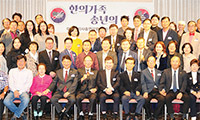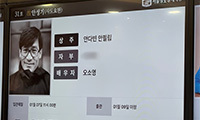The town’s most distinctive cultural landmark remains the House of Humor and Satire, a dour hulk from the early 1970s. Black-and-white photographs from the day the House opened in 1971 show mobs of smiling Gabrovians jamming the square outside the building, then a spanking new Modernist box with a metal statue of Don Quixote in front, where apparatchiks wearing plaid leisure suits greeted Todor Zhivkov, Bulgaria’s strongman leader.
“There’s nothing funny in the picture but everybody’s laughing,” is how Galina Boneva analyzed the image one recent day. In charge of media affairs for the House, Ms. Boneva added, “That’s the joke,” as if Gabrovians had pretended to be uproarious for the purpose of being collectively satirical.
Or maybe Ms. Boneva was kidding. Laughter is said to be the universal language. But that must be a joke itself. Humor seems the clearest illustration of the greater truth that not everything translates from one society or era to another.
Officials at the House of Humor and Satire talk about becoming popular again, if only they could come up with the money and a good plan. Across the former Communist world, museums like the House have been repurposed as ironic attractions for tourists. Funnily, the House of Humor and Satire isn’t one of these. It lacks irony. It’s a family attic of oddball art, historical installations, satirical drawings .
It once functioned as a cold war crossroad and propaganda tool. The House’s biennial humor festivals were conceived by Communist officials to cultivate an image of Bulgaria, and by extension the larger Soviet realm, as open to outsiders. The House became a window between worlds.
In those festival days busloads of Soviet-bloc tourists waited each morning for the doors to open. A large staff published satire and humor, held a film festival, staged plays, brought in writers from humor magazines like Punch and The National Lampoon, handed out literary prizes to the likes of Joseph Heller and Kurt Vonnegut.
The BBC made a documentary about the House. The New Yorker magazine wrote a profile of the town. Now, the House has trouble paying a skeletal staff’s meager salaries. “It was not an overnight success becoming the humor capital of Bulgaria,” Ms. Boneva said.
She stood before a tatty display tracing the source of Gabrovian wit to a certain Old Minyo, a 19th-century local philanthropist of fabled abstemiousness who was said to have carried his shoes on long walks, so as to spare their soles .
In the 1970s local leaders proposed creating the House of Humor. Tatyana Tsankova, the House’s longtime director, recalled that Communist officials saw this as an ideological opportunity “to show that humor could prosper here under Communism, within limits of course.” For abstract and religious artists in the Soviet sphere, the House was also one of the few Communist institutions that agreed to exhibit and collect their work. A crucifixion given an ironic title passed as satire.
Ms. Boneva gestured toward a large sculpture of a cat . A donation makes the cat cluck like a chicken. It happens that I had visited the House of Humor and Satire before, during the early 1980s. My parents, loyal Communists, stopped here one sunny summer day on the way to the Black Sea.
I remember being taken around by a guide who might well have been the younger Ms. Boneva. My father roared at the assortment of what seemed to me to be humorless art. My takeaway message: that the House of Humor exemplified cold war politics and the sort of misbegotten dreams that could cause a humane American physician with a scientist’s penchant for logic to laugh at what seemed unfunny. But history, like memory and the effectiveness of satire, changes with age along with one’s perspective.
Gabrovo comes across differently on second glance, more sympathetically, precisely because it has been fossilized. In a climate of blinkered, polarized politics, especially to a young smartalecky New Yorker, the museum could appear to be a crude instrument of cold war propaganda. But in the more fractured reality of a global age, it came to seem special, something actually to be treasured all the more for its flaws and as an anachronism.
I heard myself laughing, exactly as my father had done. I laughed out of politeness and slight embarrassment at the earnestness of the exhibitions. I laughed because I felt touched by Ms. Boneva’s devotion. And I laughed because the world is precious and heartbreaking for being complicated.
My father may well have had the same reaction when he visited. He wanted to be nice when he got to the House of Humor. He wasn’t being a good Communist, just a good man.
MICHAEL KIMMELMAN/ESSAY
스마터리빙
more [ 건강]
[ 건강]이제 혈관 건강도 챙기자!
[현대해운]우리 눈에 보이지 않기 때문에 혈관 건강을 챙기는 것은 결코 쉽지 않은데요. 여러분은 혈관 건강을 유지하기 위해 어떤 노력을 하시나요?
 [ 건강]
[ 건강]내 몸이 건강해지는 과일궁합
 [ 라이프]
[ 라이프]벌레야 물럿거라! 천연 해충제 만들기
 [ 건강]
[ 건강]혈압 낮추는데 좋은 식품
[현대해운]혈관 건강은 주로 노화가 진행되면서 지켜야 할 문제라고 인식되어 왔습니다. 최근 생활 패턴과 식생활의 변화로 혈관의 노화 진행이 빨라지고
사람·사람들
more
LA 러너스클럽 새해맞이 등반 행사
LA 러너스클럽(회장 대니얼 임)은 지난 1일 새해맞이 그리피스팍 등반 행사를 가졌다. 이날 회원 30여 명은 쏟아지는 비 속에서도 그리피스팍…

미주한의사총연 송년행사
미주한의사총연합회(회장 조본환·이사장 서영수) 송년회가 지난달 14일 LA 옥스포드 팔레스 호텔에서 열렸다. 이날 행사에서는 프란시스코 김 캘…
[인터뷰-문경환 한인회장] “캔자스, 이민자들에 … 1
“캔자스시티는 삶의 속도와 기회의 균형이 잘 맞는 도시입니다. 제2의 인생을 시작하기에 더없이 좋은 곳이죠.”29일 본보를 방문한 문경환(61…
일사회 창립 14주년 기념식 및 송년행사
전·현직 민주평통자문위원들의 모임인 일사회(회장 박철웅)는 지난 16일 용수산에서 창립 14주년 기념식 및 송년회를 개최했다. 이날 행사에는 …
LA평통 통일전략분과 상견례
LA 평통(회장 장병우) 통일전략분과(위원장 이정현)는 지난 27일 형제갈비에서 상견례 겸 간담회를 개최했다. 이날 모임에서는 위원 간 교류를…
많이 본 기사
- 마두로 축출에 갈라진 지구촌… “국제법 위반” vs “환영”
- 가주 DMV 리얼 ID 발급 ‘전산 오류’
- 트럼프, 베네수엘라 전격 군사작전… 마두로 ‘축출’
- 캘리포니아 ‘직장 내 권리 알림법’ 시행 돌입
- [마두로 체포 막전막후] ‘델타포스’ 침투 5분만에 전광석화 체포… 은신처 대피 못해
- 연방 항소법원 “총기 공개적 휴대 금지 가주법 위헌”
- ‘국민 배우’ 안성기 별세 혈액암 투병, 향년 74세
- LAX 또 항공편 대거 취소·지연 사태
- 황희찬 ‘PK 1골+1도움’… 울버햄프턴, 개막 20경기 만에 첫 승
- ‘브라운 50점’ 보스턴, 클리퍼스 꺾고 3연승
- 한인타운 인근 상가서 묻지마 총격 2명 사상
- 입국 제한 확대… 추가 20개국 이민 신청 전면 중단
- “트럼프 폭주… 달러 패권 흔들”
- 일본프로야구 홈런왕 오카모토 토론토와 4년 6천만달러 계약
- 역대 최고령 45세 윌리엄스 호주오픈 여단식 본선 출전
- [이민법 칼럼] 시민권 박탈
- Crinks 세력이 크게 꺾이는 그런 해가…
- LA 총영사관 시무식… “민원 서비스 강화”
- 30년 모기지, 최저치 6.15%로 지난해 마감
- 소비자들 지갑 열까?… 올해 소비 전망 대체로 ‘양호’
- 루비오 국무, ‘베네수엘라 총독’ 되나
- 재정보조만으로 부족한 대학 학비… 장학금 신청으로 해결
- LA 평통 내일 시무식
- 오픈AI, 직원 주식보상도 ‘역대급’
- LA 러너스클럽 새해맞이 등반 행사
- [부음] 오동균 장로
- 하늘길 막은 ‘불청객’… 인천공항 운항 피해 5년새 107건
- [데이빗 이그나티우스 칼럼] 신년맞이 퀴즈: 2026년에는 좋은 일이 있을까?
- 지표 보면 경제 알 수 있다… 경기 향방 가늠 10대 지표
- 셀트리온, 미 뉴저지 생산시설 인수… CDMO 영토 넓힌다
- 뉴욕증시, 새해 첫 거래 혼조세 마감
- 시간이 머무는 곳
- [만화경] 집권 2년 차 징크스
- 백화점 ‘삭스피프스’… ‘챕터11’ 보호신청 검토
- [신년 집중기획/2026 새해 이렇게 바뀐다] 이민 제도 5대 변화… 영주권자까지도 입국시 안면인식 생체정보 수집
- Art Major -Beyond the Canvas
- 가주 ‘억만장자세’ 추진… 파문 확산
- 가주, 개인정보 보호법 ‘초강수’
- [재계 주요 그룹 총수 신년사] “불확실성의 일상화… 빠른 결단·선제적 대응이 열쇠”
- 국회·세종 청사·항만 노출… ‘안티드론’ 구축률 10%도 안 돼
- “올해 도약 원년”… 토종 AI유니콘, 글로벌 시장 정조준
- 메디케이드 정보 이민국 공유 ‘허용’
- 60년 만 ‘투자 귀재’ 없는 첫 주
- “미, 상호관세 부과 능력 계속 유지해야”
- “재정보조금이 대학의 NPC결과와 차이가 나는 이유”
- 보류는 끝이 아닌 ‘다시 뛰기 위한 준비시간’
- 2026년 새해 계획
- AI 시대에 제안하는 학부모님들을 위한 새해 결심
- “올해도 미 성장 지속… S&P 500 두 자릿수↑”
- 급조된 노력으론 명문대 힘들어… ‘새해부터 준비할 일’
1/5지식톡

-
 미 육군 사관학교 West Poin…
0
미 육군 사관학교 West Poin…
0https://youtu.be/SxD8cEhNV6Q연락처:wpkapca@gmail.comJohn Choi: 714-716-6414West Point 합격증을 받으셨나요?미 육군사관학교 West Point 학부모 모…
-
 ☝️해외에서도 가능한 한국어 선생님…
0
☝️해외에서도 가능한 한국어 선생님…
0이 영상 하나면 충분합니다!♥️상담신청문의♥️☝️ 문의 폭주로 '선착순 상담'만 진행합니다.☎️ : 02-6213-9094✨카카오톡ID : @GOODEDU77 (@골뱅이 꼭 붙여주셔야합니다…
-
 테슬라 자동차 시트커버 장착
0
테슬라 자동차 시트커버 장착
0테슬라 시트커버, 사놓고 아직 못 씌우셨죠?장착이 생각보다 쉽지 않습니다.20년 경력 전문가에게 맡기세요 — 깔끔하고 딱 맞게 장착해드립니다!장착비용:앞좌석: $40뒷좌석: $60앞·뒷좌석 …
-
 식당용 부탄가스
0
식당용 부탄가스
0식당용 부탄가스 홀세일 합니다 로스앤젤레스 다운타운 픽업 가능 안녕 하세요?강아지 & 고양이 모든 애완동물 / 반려동물 식품 & 모든 애완동물/반려동물 관련 제품들 전문적으로 홀세일/취급하는 회사 입니다 100% …
-
 ACSL 국제 컴퓨터 과학 대회, …
0
ACSL 국제 컴퓨터 과학 대회, …
0웹사이트 : www.eduspot.co.kr 카카오톡 상담하기 : https://pf.kakao.com/_BEQWxb블로그 : https://blog.naver.com/eduspotmain안녕하세요, 에듀스팟입니다…
케이타운 1번가
오피니언

Crinks 세력이 크게 꺾이는 그런 해가…
 윤경환 서울경제 뉴욕 특파원
윤경환 서울경제 뉴욕 특파원 60년 만 ‘투자 귀재’ 없는 첫 주
 데이빗 이그나티우스 워싱턴포스트 칼럼니스트
데이빗 이그나티우스 워싱턴포스트 칼럼니스트 [데이빗 이그나티우스 칼럼] 신년맞이 퀴즈: 2026년에는 좋은 일이 있을까?
 조옥규 수필가
조옥규 수필가 시간이 머무는 곳
 홍병문 / 서울경제 논설위원
홍병문 / 서울경제 논설위원 [만화경] 집권 2년 차 징크스
 손영아 문화 칼럼니스트 / YASMA7 대표
손영아 문화 칼럼니스트 / YASMA7 대표 [손영아의 문화산책] ‘슈만의 연가’… 170년 전 멈춘 시간, 끝나지 않은 사랑
 김재천 서강대 국제대학원 교수
김재천 서강대 국제대학원 교수 [김재천 칼럼] 2026년, 미·중 대타협은 가능할까
 조지 F·윌 워싱턴포스트 칼럼니스트
조지 F·윌 워싱턴포스트 칼럼니스트 [조지 F. 윌 칼럼] AI 투자 붐이 걱정된다면?… 역사적 맥락을 보라
 이희숙 시인·수필가
이희숙 시인·수필가 [금요단상] 차가운 길, 이불 한 장의 온기
1/3지사별 뉴스

뉴욕시 첫 무슬림 시장 맘다니 취임
미국 최대도시이자 경제 수도로 꼽히는 뉴욕시의 첫 무슬림·남아시아계 시장이자 스스로를 민주사회주의자라고 부르는 조란 맘다니 신임 뉴욕시장이 새…
뉴욕시민 기대수명 82.6세⋯팬데믹 이전 회복

건국 250주년 워싱턴 모뉴먼트 라잇쇼
워싱턴 DC 내셔널 몰 중심에 위치한 워싱턴 모뉴먼트(Washington Monument)가 화려한 불빛으로 장식됐다. 지난 31일 새해 카운…
“소확행<작지만 확실한 행복> 즐겨요”

[美 마두로 축출] 트럼프 “베네수엘라 부통령이 잘하면 미군 주둔 안해”
도널드 트럼프 대통령은 베네수엘라 측이 미국이 바라는 대로 행동하는 한 미군이 베네수엘라에 주둔하지 않을 것이라고 말했다고 뉴욕포스트가 3일 …
중부 캘리포니아 ‘한인 이민사’ 나왔다

오늘 하루 이 창 열지 않음 닫기 


















































.png)


댓글 안에 당신의 성숙함도 담아 주세요.
'오늘의 한마디'는 기사에 대하여 자신의 생각을 말하고 남의 생각을 들으며 서로 다양한 의견을 나누는 공간입니다. 그러나 간혹 불건전한 내용을 올리시는 분들이 계셔서 건전한 인터넷문화 정착을 위해 아래와 같은 운영원칙을 적용합니다.
자체 모니터링을 통해 아래에 해당하는 내용이 포함된 댓글이 발견되면 예고없이 삭제 조치를 하겠습니다.
불건전한 댓글을 올리거나, 이름에 비속어 및 상대방의 불쾌감을 주는 단어를 사용, 유명인 또는 특정 일반인을 사칭하는 경우 이용에 대한 차단 제재를 받을 수 있습니다. 차단될 경우, 일주일간 댓글을 달수 없게 됩니다.
명예훼손, 개인정보 유출, 욕설 등 법률에 위반되는 댓글은 관계 법령에 의거 민형사상 처벌을 받을 수 있으니 이용에 주의를 부탁드립니다.
Close
x